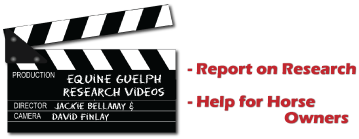Researcher Profiles
Dr. Judith Koenig
| View Dr. Koenig's University of Guelph profile |
 |
"For me, it doesn't make a difference if the horse that I am treating is a backyard pet or from the most expensive stable, any horse deserves the best possible treatment…this has always been my philosophy." |
Dr. Koenig feels that it is extremely important to inform the public about equine research and deliver sound knowledge that can be used to benefit the well-being of horses. There are many conditions in horses that are generally believed to be non-treatable, for example certain types of fractures that can actually be healed successfully, and it is important that current and accurate information be made available. She states "we do a lot of neat stuff here at OVC and we have people with a great deal of expertise and knowledge".
| Dr. Koenig discusses her research in our special feature REPORT ON RESEARCH |
|
Equine Related Hero: All horses are notable, however one of the nicest horses she ever met and had the opportunity to treat was the Canadian thoroughbred Wando, a winner of Canada's Triple Crown and Canada's 2003 Horse of the Year Award. Wando's very sweet personality and the magnitude of love he received from his caretakers are a few reasons why he is one of her favorite horses.
Horse Background: Dr. Koenig has always been genuinely passionate about horses. As a child and teenager in Austria she enjoyed trail riding, jumping and dressage and would groom and muck out stalls to pay for riding lessons. She had the wonderful opportunity to show horses trained at the Prix St. George and Grand Prix levels and earned the qualifications to participate in dressage tournaments in Germany and Austria. Her determination and passion to become a doctor with humans or animals was made during her early childhood years. Following a sad experience at the age of twelve, where a horse she had cared for and greatly loved died from a ruptured stomach, Dr. Koenig knew she wished to be an equine veterinary surgeon. Presently Dr. Koenig enjoys trail riding in the woods when time allows, is an "absolute" mountain person and her dream is to ride across the Rockies.
Area of Specialty:
-
Equine soft tissue surgery with emphasis on gastrointestinal surgery
-
Substances that enhance wound healing
Degrees: Mag. Med. Vet., Dr. Med. Vet (VIENNA), DVSc ( Guelph), Dipl. ACVS, Dipl. ECVS
Position: Faculty member, Large Animal Surgery, Ontario Veterinary College, University of Guelph
Responsibilities:
Teaching undergraduate students - equine surgery and anesthesia, third year surgery lab, and bovine gastrointestinal diseases and fourth year clinical rotations
Teaching graduate and resident students
Practicing equine surgeon
Research Related Goals: A potential post-operative complication of colic surgery is reduced or absent gut motility (ileus), which can be fatal to the horse. Dr. Koenig is developing non-invasive methods to monitor gut motility in order to better characterize ileus development and investigate new treatment regiments. In humans, a new method called electrogastrography (EGG) is employed to measure stomach motility with surface electrodes, however, protocols and guidance are not readily available for the use of similar methods in horses. Dr. Koenig will be the first to adapt electrogastrography protocols for use in horses through specialized training in a human gastroenterology laboratory. An ileus model will be created in horses and EGG used for identifying changes in gut motility and the evaluation of various non-invasive treatments to treat ileus. Ultrasound and laparoscopic techniques will be employed in designing this model.
When intestinal motility is compromised, prokinetic agents (agents used to stimulate motility) may be used in humans and other species to successfully promote movement of feed material through the gastrointestinal tract. Based on studies in people and in other animals, the antibiotic erythromycin lactobionate (EB), is a prokinetic drug, which may work in horses. The drug works by binding to motilin (a hormone that increases intestinal motility) receptors that are located on the smooth muscle and nerves of the bowel. Dr. Koenig has determined, in healthy horses, that horses have motilin receptors and that EB also binds to these receptors. However, in the face of inflammation of the bowel, as is the case with ileus, EB does not seem effective. Dr. Koenig is conducting research, funded by the Ontario Ministry of Agriculture, Food and Rural Affairs, and Equine Guelph to investigate why this occurs. She believes that inflammation of the bowel associated with ileus might cause motilin receptors to change or disappear, thus eliminating a target for the drugs and their inability to induce motility.
Background: Dr. Koenig was born in Austria and earned her Masters and Doctorate of Veterinary Medicine degrees from the University of Veterinary Medicine Vienna. While in Vienna she also worked at the university as an assistant surgeon where she conducted research on non-invasive methods to monitor oxygenation during colic surgery in horses. As part of her Doctorate program, she conducted research in the area of equine anesthesia at OVC under the supervision of Dr. Wayne McDonell. During this time, she was exposed to many opportunities to become a very well-trained surgeon and fell in love with a Canadian whom she married. After finishing her studies in Vienna, she completed a one year internship at OVC followed by a fellowship in Oregon. Dr. Koenig returned to OVC for a large animal surgery residency program, after which she was hired as a staff surgeon in large animal surgery and then a faculty member with OVC in 2005.
Additional Accomplishments:
